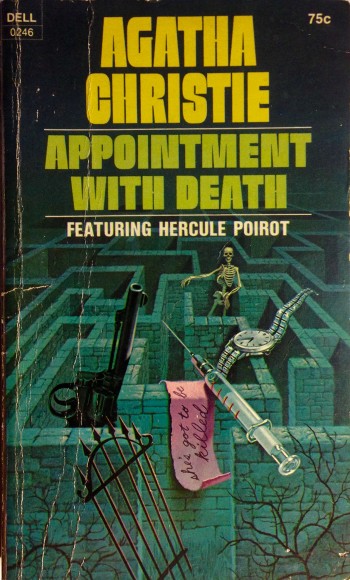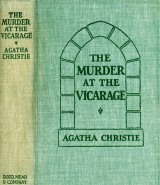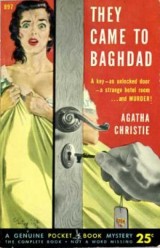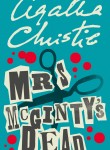August 2, 2022
 I’ve read, I think (though I haven’t kept the meticulous records I should have), at least 80% of all the Agatha Christie books, and yet I’ve still only a small handful of Agatha Christie Cocktail Talks on the ol’ Spiked Punch. That, friends, is a shame! But she doesn’t always have her characters swilling in the Cocktail Talk style, though Poirot (if I have to explain who that is, well, you need help) does like his crème de menthe and suchlike, and folks are swilling in her books. Probably, I get too caught up in the mysteries themselves, like in Appointment with Death, one of the ‘Poirot-on-travels’ variety, where he is in Middle East when a not-very-nice-at-all matriarch is murdered – at least, he thinks it is murder! He ends up hanging with a local gendarme to get to the bottom of things, cause (as everyone knows) Poirot doesn’t like murder! The particular usage of that phrase by someone else I believe caught my eye twice in the below quote, along with the whiskey and soda being consumed. So, this time, though I was deep into the mystery, I still did a double take and took the quote along for this very Cocktail Talk.
I’ve read, I think (though I haven’t kept the meticulous records I should have), at least 80% of all the Agatha Christie books, and yet I’ve still only a small handful of Agatha Christie Cocktail Talks on the ol’ Spiked Punch. That, friends, is a shame! But she doesn’t always have her characters swilling in the Cocktail Talk style, though Poirot (if I have to explain who that is, well, you need help) does like his crème de menthe and suchlike, and folks are swilling in her books. Probably, I get too caught up in the mysteries themselves, like in Appointment with Death, one of the ‘Poirot-on-travels’ variety, where he is in Middle East when a not-very-nice-at-all matriarch is murdered – at least, he thinks it is murder! He ends up hanging with a local gendarme to get to the bottom of things, cause (as everyone knows) Poirot doesn’t like murder! The particular usage of that phrase by someone else I believe caught my eye twice in the below quote, along with the whiskey and soda being consumed. So, this time, though I was deep into the mystery, I still did a double take and took the quote along for this very Cocktail Talk.
Colonel Carbury said unemotionally, “He don’t like murder! Quite right! No more do I!” He rose and poured himself out a stiff whiskey and soda; his guests’ glasses were still full. “And now,” he said, returning to the subject, “let’s get down to brass tacks.”
–Agatha Christie, Appointment with Death
July 5, 2022
 I’m sometimes the tiniest bit sad when re-reading The Murder at the Vicarage, knowing that it will never again be like the first time (though some say nothing is the like a first time, I’m not sure that’s as true a cliché as one might think, in general, by the way). Just cause, it’s the first book featuring Agatha Christie’s incomparable Miss Marple (I believe there was a story with her published before this book, funny enough, but for so many, this book was her introduction), and so when reading it without knowing much about her, she seems at the beginning a minor character, a charmingly (maybe this is hindsight) gossipy, watchful, inquisitive small village older lady (or old maid, in a non-pejorative way). And then as the book unfolds, you – dear reader – slowly become aware that she’s the stuff, the one with the insights, and the sharpest tool the St. Mary Mead (the village in question) shed. Now, while that feeling can’t return on subsequent readings, I still enjoy the re-read. It’s jolly good fun to see how Agatha C plays against the preconceived notions around the elderly, and how she unveils Miss Marple being Marple. And you see clues you may have missed, pick up on characterizations that might have seemed less important, and of course get to revel in the language again. Heck, now I sort-of want to read it once more (I’m sure I will, if life allows). And, there’s cherry brandy! What a book.
I’m sometimes the tiniest bit sad when re-reading The Murder at the Vicarage, knowing that it will never again be like the first time (though some say nothing is the like a first time, I’m not sure that’s as true a cliché as one might think, in general, by the way). Just cause, it’s the first book featuring Agatha Christie’s incomparable Miss Marple (I believe there was a story with her published before this book, funny enough, but for so many, this book was her introduction), and so when reading it without knowing much about her, she seems at the beginning a minor character, a charmingly (maybe this is hindsight) gossipy, watchful, inquisitive small village older lady (or old maid, in a non-pejorative way). And then as the book unfolds, you – dear reader – slowly become aware that she’s the stuff, the one with the insights, and the sharpest tool the St. Mary Mead (the village in question) shed. Now, while that feeling can’t return on subsequent readings, I still enjoy the re-read. It’s jolly good fun to see how Agatha C plays against the preconceived notions around the elderly, and how she unveils Miss Marple being Marple. And you see clues you may have missed, pick up on characterizations that might have seemed less important, and of course get to revel in the language again. Heck, now I sort-of want to read it once more (I’m sure I will, if life allows). And, there’s cherry brandy! What a book.
I agreed, and at that moment the door opened and Miss Marple made her appearance.
“Very sorry to bother you, Miss Marple,” said the Colonel when I had introduced him, putting on his bluff, military manner, which he had an idea was attractive to elderly ladies. “Got to do my duty, you know?”
“Of course, of course,” said Miss Marple. “I quite understand. Won’t you sit down? And might I offer you a little glass of cherry brandy? My own making. A recipe of my grandmother’s.”
–Agatha Christie, The Murder at the Vicarage
September 14, 2021
 Agatha (Christie, naturally — not to throw shade on other Agathas, but really, if just using the first name “Agatha” don’t most people’s minds head towards her? Just me?) is deservedly known best for her detective (whether Belgian, small town observer, or husband-wife team) books. But she wrote others, too! Some falling into what I’d call “international intrigue,” including They Came To Baghdad. She was a well-traveled writer, with a flair for description, and so writing more globe-trotting – as opposed to set in the UK – books makes sense. Though, I have to admit, there are lots of mysterious threads intertwining here, but hey, she knows her stuff. Basically, after some set-up and stage-setting and character introducing, and a lot of “what’s happening here”-ing, the story follows Victoria Jones, who loses her job, meets a nice chap in a park, decides she’s in love, follows him (by picking up a random job with free airline tickets) to Baghdad, and drops right into a worldwide conspiracy, nearly gets killed, gets kidnapped, goes on an archeology dig, and stays in a hotel run by a man named Marcus who likes to buy drinks, which are delivered by a waiter named Jesus. And a whole lot more! There are murders, twists, neat scenes, and more drinks. Well worth picking up!
Agatha (Christie, naturally — not to throw shade on other Agathas, but really, if just using the first name “Agatha” don’t most people’s minds head towards her? Just me?) is deservedly known best for her detective (whether Belgian, small town observer, or husband-wife team) books. But she wrote others, too! Some falling into what I’d call “international intrigue,” including They Came To Baghdad. She was a well-traveled writer, with a flair for description, and so writing more globe-trotting – as opposed to set in the UK – books makes sense. Though, I have to admit, there are lots of mysterious threads intertwining here, but hey, she knows her stuff. Basically, after some set-up and stage-setting and character introducing, and a lot of “what’s happening here”-ing, the story follows Victoria Jones, who loses her job, meets a nice chap in a park, decides she’s in love, follows him (by picking up a random job with free airline tickets) to Baghdad, and drops right into a worldwide conspiracy, nearly gets killed, gets kidnapped, goes on an archeology dig, and stays in a hotel run by a man named Marcus who likes to buy drinks, which are delivered by a waiter named Jesus. And a whole lot more! There are murders, twists, neat scenes, and more drinks. Well worth picking up!
“Come and have a drink with us Miss Jones. Martini – Sidecar? This is Mr. Dakin. Miss Jones from England. Now then, my dear, what will you have?”
Victoria said she would have a Sidecar “and some of those lovely nuts?” she suggested hopefully, remembering that nuts were nutritious.
“You like nuts? Jesus!” He gave the order in rapid Arabic. Mr. Dakin said in a sad voice that he would have a lemonade.
“Ah,” cried Marcus, “but that is ridiculous.”
–Agatha Christie, They Came to Baghdad
June 29, 2021
 Ah, Poirot. Hercule Poirot, that is (are there other Poirots? If so, I feel for them). I know that with many books, shows, films, poems, and sculptures, some may feel a Poirot overload at times – and this isn’t even to mention the many, many, Poirot imitations and bowdlerizations. But I still love the egg-shaped Belgian, in book and movie and TV show form. Thank you Mrs. Christie! Somedays, dipping back into a Poirot yarn is just the relief a long day needs. Especially when Poirot starts hitting the sweet liqueurs (you could probably guess this), which I’ll admit also loving, probably a rarity among English speakers in his day (well, the day his adventures were set within, that is), though hopefully something not as rare today, with our lucky-for-us wider palate of bar bottle resources and consumption. Hopefully! Anyway, this is all to say, I was re-reading the classic Poirot book Mrs. McGinty’s Dead, which has it all – a murder, a perhaps wronged potential murderer, small town England townies, historical murders, more murders, and very tight patent-leather shoes. Plus: well-groomed mustaches of course! And, a wonderful listing of Poirot’s fav sweet tipples, and beer.
Ah, Poirot. Hercule Poirot, that is (are there other Poirots? If so, I feel for them). I know that with many books, shows, films, poems, and sculptures, some may feel a Poirot overload at times – and this isn’t even to mention the many, many, Poirot imitations and bowdlerizations. But I still love the egg-shaped Belgian, in book and movie and TV show form. Thank you Mrs. Christie! Somedays, dipping back into a Poirot yarn is just the relief a long day needs. Especially when Poirot starts hitting the sweet liqueurs (you could probably guess this), which I’ll admit also loving, probably a rarity among English speakers in his day (well, the day his adventures were set within, that is), though hopefully something not as rare today, with our lucky-for-us wider palate of bar bottle resources and consumption. Hopefully! Anyway, this is all to say, I was re-reading the classic Poirot book Mrs. McGinty’s Dead, which has it all – a murder, a perhaps wronged potential murderer, small town England townies, historical murders, more murders, and very tight patent-leather shoes. Plus: well-groomed mustaches of course! And, a wonderful listing of Poirot’s fav sweet tipples, and beer.
Poirot pressed his guest with refreshments. A grenadine? Crème de Menthe? Benedictine? Crème de Cacao…
At this moment George entered with a tray on which was a whisky bottle and a siphon. “Or beer if you prefer it, sir?” he murmured to the visitor.
Superintendent Spence’s large red face lightened.
“Beer for me,” he said.
Poirot was left to wonder once more at the accomplishments of George. He himself had had no idea that there was beer in the flat and it seemed incomprehensible to him that it could be preferred to a sweet liqueur.
When Spence had his foaming tankard, Poirot poured himself out a tiny glass of gleaming green crème de menthe.
–Agatha Christie, Mrs. McGinty’s Dead
Tags: Agatha Christie, beer, Benedictine, Cocktail Talk, crème de cacao, Crème de menthe, grenadine, Hercule Poirot, Mrs. McGinty’s Dead, Poirot, Whiskey
Posted in: beer, Cocktail Talk, Liqueurs, Whiskey
 I’ve read, I think (though I haven’t kept the meticulous records I should have), at least 80% of all the Agatha Christie books, and yet I’ve still only a small handful of Agatha Christie Cocktail Talks on the ol’ Spiked Punch. That, friends, is a shame! But she doesn’t always have her characters swilling in the Cocktail Talk style, though Poirot (if I have to explain who that is, well, you need help) does like his crème de menthe and suchlike, and folks are swilling in her books. Probably, I get too caught up in the mysteries themselves, like in Appointment with Death, one of the ‘Poirot-on-travels’ variety, where he is in Middle East when a not-very-nice-at-all matriarch is murdered – at least, he thinks it is murder! He ends up hanging with a local gendarme to get to the bottom of things, cause (as everyone knows) Poirot doesn’t like murder! The particular usage of that phrase by someone else I believe caught my eye twice in the below quote, along with the whiskey and soda being consumed. So, this time, though I was deep into the mystery, I still did a double take and took the quote along for this very Cocktail Talk.
I’ve read, I think (though I haven’t kept the meticulous records I should have), at least 80% of all the Agatha Christie books, and yet I’ve still only a small handful of Agatha Christie Cocktail Talks on the ol’ Spiked Punch. That, friends, is a shame! But she doesn’t always have her characters swilling in the Cocktail Talk style, though Poirot (if I have to explain who that is, well, you need help) does like his crème de menthe and suchlike, and folks are swilling in her books. Probably, I get too caught up in the mysteries themselves, like in Appointment with Death, one of the ‘Poirot-on-travels’ variety, where he is in Middle East when a not-very-nice-at-all matriarch is murdered – at least, he thinks it is murder! He ends up hanging with a local gendarme to get to the bottom of things, cause (as everyone knows) Poirot doesn’t like murder! The particular usage of that phrase by someone else I believe caught my eye twice in the below quote, along with the whiskey and soda being consumed. So, this time, though I was deep into the mystery, I still did a double take and took the quote along for this very Cocktail Talk.























